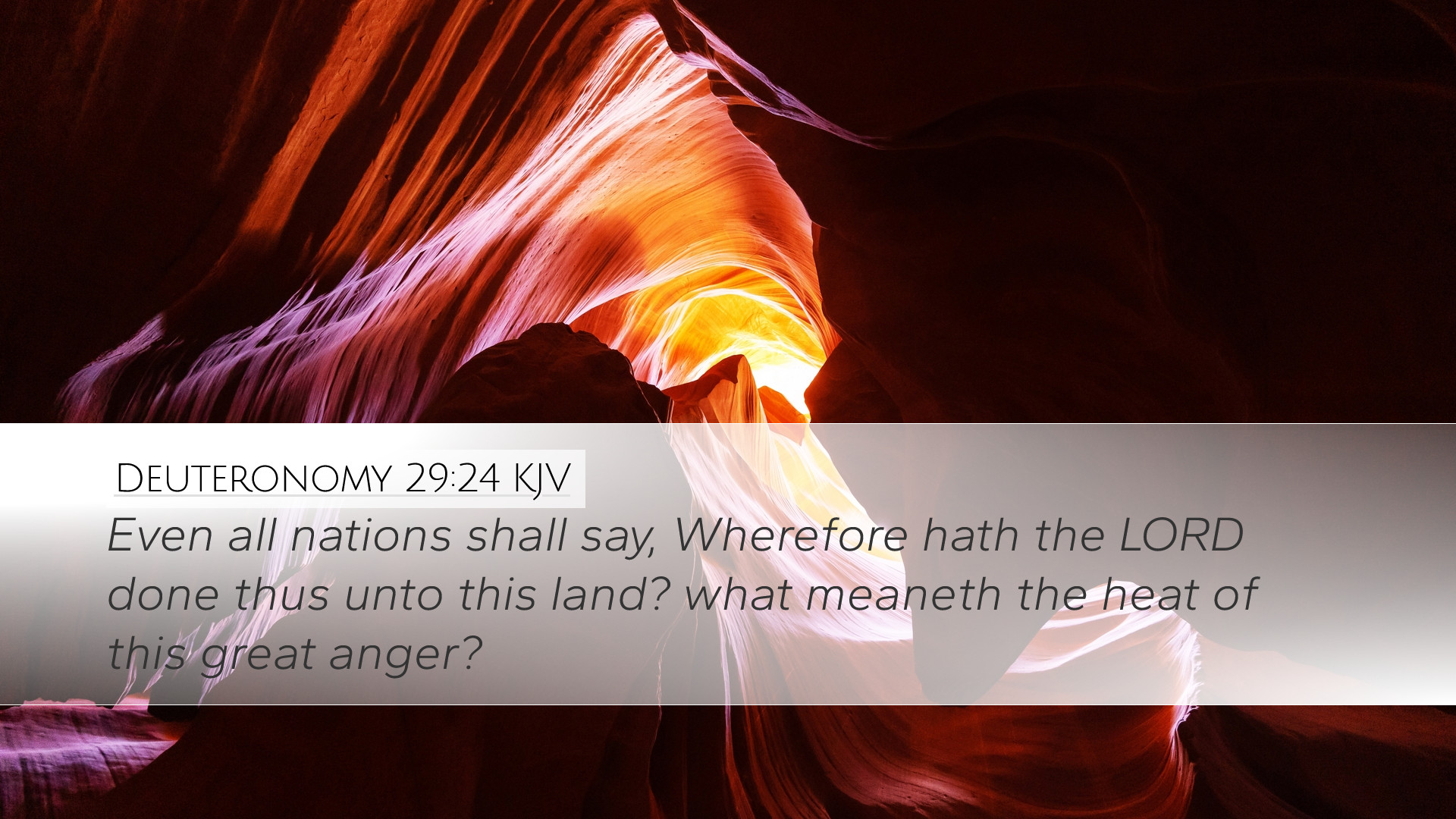Commentary on Deuteronomy 29:24
Verse Text: "Even all nations shall say, Wherefore hath the LORD done thus unto this land? What meaneth the heat of this great anger?" (KJV)
Introduction
This verse occurs within the exhortation of Moses to the Israelites, where he emphasizes the importance of covenant faithfulness and the implications of disobedience. It serves as a poignant reminder that the responses of both the Israelites and surrounding nations hinge on the visible demonstrations of God's favor or displeasure.
Contextual Analysis
This verse is situated in the larger narrative where Moses addresses the collective assembly of Israel, reminding them of the covenant and the consequences of breaking it. The theme of national identity and divine justice plays a critical role in understanding why such questions arise from the nations.
Moses' Warning
Matthew Henry's Commentary: Henry highlights Moses' foresight regarding Israel's failure to uphold their covenant obligations. He notes that the observable judgment resulting from this failure would provoke questions from surrounding nations, demonstrating a concern for Israel's testimony before the world. Henry stresses the importance of living in a manner that glorifies God, as Israel's fate would reflect either his mercy or justice.
The Nature of God's Anger
Albert Barnes' Notes: Barnes elaborates on the idea that God’s anger is a righteous response to sin and disobedience. He indicates that the "heat of this great anger" is not arbitrary but a direct result of Israel's actions. This anger is significant, as it not only affects Israel but also serves as a witness to other nations about the seriousness of sin and the nature of divine justice.
Theological Implications
Adam Clarke's Commentary: Clarke explains that this verse encapsulates the warning against complacency and presumption regarding God's grace. He points out that when nations observe devastating consequences—both natural and social—they will inherently question the relationship between moral behavior and divine favor. Clarke’s insights lead to an understanding that God's actions are intentional and convey lessons to both Israel and the nations.
The Role of Witness
Consider how Israel's standing before God served as a witness to the nations. The critical question posed by the nations signifies an awareness of God's power and justice. It underscores the view that Israel's experience is part of God's larger purpose in revealing Himself to the world.
- Impact on Nations: The nations notice the severity of God's judgment as an indication of his displeasure, leading them to ponder the ethical and moral failures in Israel.
- God's Sovereignty: This verse reinforces the idea that God is sovereign over nations and uses Israel’s experiences as a teaching tool for all people.
Practical Application
For modern readers—whether they are pastors, students, or theologians—the application of this verse can be multifaceted:
- Covenantal Responsibility: Believers are reminded of their commitment to live faithfully, understanding that their actions carry weight and can either glorify or tarnish God’s name.
- Witness to the World: The church is called to reflect God’s holiness in a world that is watching. The manner in which believers respond to trials can lead others to inquire about faith and obedience.
- Understanding Divine Discipline: Just as Israel faced consequences for their disobedience, believers today must recognize divine discipline as a means of correction and restoration.
Conclusion
Deuteronomy 29:24 serves as a striking reminder of the implications of covenant life. It urges believers to consider the weight of their witness and the potential questions that arise from living either in faithfulness or rebellion. As the nations take note of God's dealings with Israel, so too must contemporary Christians be aware that their lives testify to the nature and character of God to a watching world.


